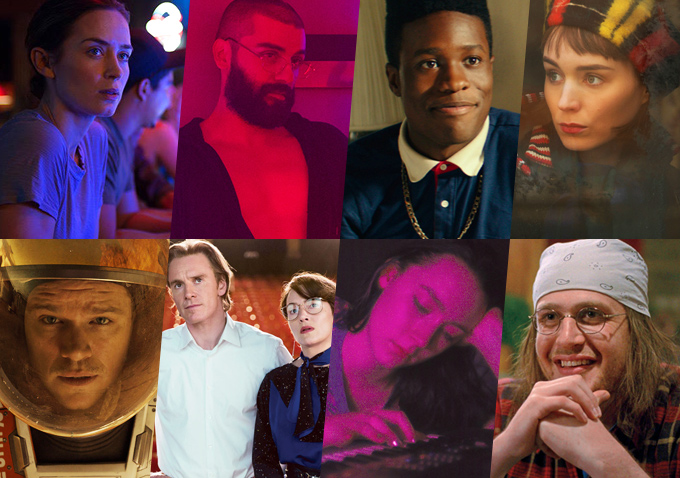 If music is the food of love, it’s also, cinematically speaking, the food of suspense, action, terror, drama, comedy, joy, ennui, sex, youth, madness, thrills and much more. Whether through original score or soundtracks, music’s been a crucial part of cinema since pianists or organists accompanied silent films, and its use is more sophisticated and varied than ever.
If music is the food of love, it’s also, cinematically speaking, the food of suspense, action, terror, drama, comedy, joy, ennui, sex, youth, madness, thrills and much more. Whether through original score or soundtracks, music’s been a crucial part of cinema since pianists or organists accompanied silent films, and its use is more sophisticated and varied than ever.
We’ve had a special interest in the crossover of movies and music since the earliest days of The Playlist, and following our list of the Best Films of 2015, we’re continuing our celebration of the year in film by rolling out our favorite scores and soundtracks from the last twelve months. For the first time, we’ve combined both original compositions and song compilations into one list.
You can read about our 30 picks below, and listen to almost all of them as well, or in one great big Spotify playlist here. Take a look, and let us know your own favorite movie music in 2015.
A quick note about our year-end coverage: We, like you and everyone else, haven’t seen “Star Wars: The Force Awakens” yet. J.J. Abrams’ Mystery Box remains firmly closed until the first reviews arrive on Wednesday. As such, like the National Board of Review or the New York Film Critics Circle or any number of voting groups that are forced to make their decisions without seeing it, ‘The Force Awakens’ won’t be appearing on the bulk of these lists for now. Once it’s been reviewed, we’ll be discussing in the film full and will indicate where it would have featured on these best-of lists retroactively. Other late December releases such as “Joy,” “The Revenant” and “The Hateful Eight,” have already been seen by at least one staffer, and may or may not be found below.
Click here for our complete coverage of the Best of 2015

30. “The Martian”
We’d be lying if we said we were completely in love with Harry Gregson-Williams’ score for Ridley Scott’s surprise mega-hit “The Martian,” which is a little more conventional, and sometimes twee, than the best of this list. But it’s in song selection that the film ends up really soaring, musically speaking. You learn fairly early on that Matt Damon’s stranded astronaut’s only musical options on his Mars base is a host of disco music left by Jessica Chastain’s commander. Damon hates disco, but nevertheless songs like “Turn The Beat Around” by Vicki Sue Robinson, “Hot Stuff by Donna Summer, “Don’t Leave Me This Way” by Thelma Houston and “Waterloo” by ABBA score some of the film’s biggest moments. They don’t just do a huge amount in softening Chastain’s otherwise stern character, but they also show the extent to which Damon’s Matt Watney is prepared to cling on to humanity: He listens to these songs, because they’re all he has. These are not obscure cuts from the depths of James Murphy’s record collections, and they’re being used by a filmmaker who’s rarely had much facility with a needle drop, but that becomes part of the appeal: By the time the film’s closing out with a montage set to, all of things, “Love Train,” you realize that the soundtrack’s a microcosm of the movie in its deeply uncool, goofy populism.
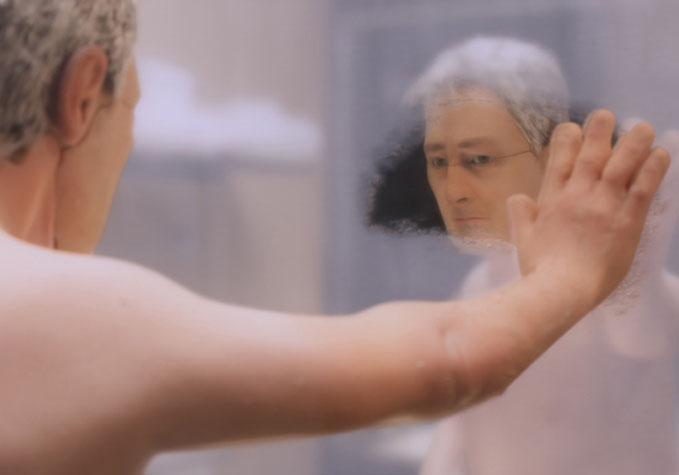
29. “Anomalisa”
It’s appropriate that “Anomalisa” provides just one part of a great year for composer Carter Burwell, given that Charlie Kaufman and Duke Johnson’s wildly acclaimed stop-motion animated film began as a one-act play that Burwell commissioned as part of his “Theater of A New Ear” project, begun because he was considering giving up film composition (the Coen Brothers were behind another play in the project). Burwell was obviously a natural choice to return for the movie adaptation, and does a tremendous job with a score that’s almost diegetic in places: Cues like ‘Fregoli Elevator’ and ‘Fregoli Bar’ evoke the emptiness and alienation of the film’s airport hotel setting — piano-bar tinkling, tinny jazz — while not driving you completely up the wall either. Of Burwell’s four scores this year (including the mildly disappointing one for “Legend”), “Anomalisa” might be the most Burwell-esque of them all, but it’s not like that’s a bad thing; while there might be echoes of other scores here, the mournful woodwind and delicate piano does so much towards giving Kaufman’s film a lonely beauty that doesn’t tip towards being twee, as would be so easy for an animated picture like this one.
(no embed available, but listen here)
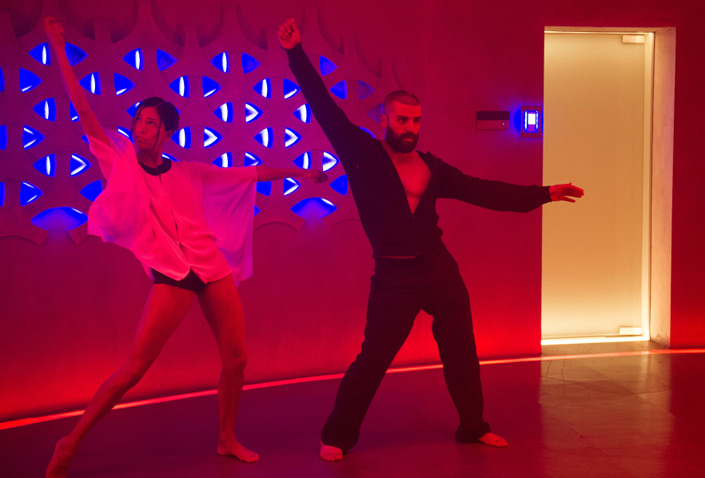
28. “Ex Machina”
Sometimes an aborted project can lead to greater things down the line. That was certainly the case for composer Ben Salisbury and Portishead member Geoff Barrow. Salisbury, a newcomer to features, and Barrow, who’d previously composed the score for “Exit Through The Gift Shop,” were first teamed to write the music for comic book picture “Dredd,” but found their John Carpenter-ish work disregarded by producers (they released their music separately). But Alex Garland, a writer and producer on the earlier film, remembered their work, and ended up hiring them for his directorial debut, the thrilling sci-fi chamber piece “Ex Machina.” As you might expect, it’s a mostly electronic piece of work, but some way from their aborted “Dredd” score, as informed by the icy expanses of the film’s Alaskan setting as by whatever electronics lie inside Alicia Vikander’s AI Ava. It’s an understated, shimmering, glacial composition, one that seems to open up the film’s spaces far beyond the claustrophobic house in which most of it takes place, and aids Garland enormously in tightening and tightening the ratchet of tension as the film reveals its narrative secrets.
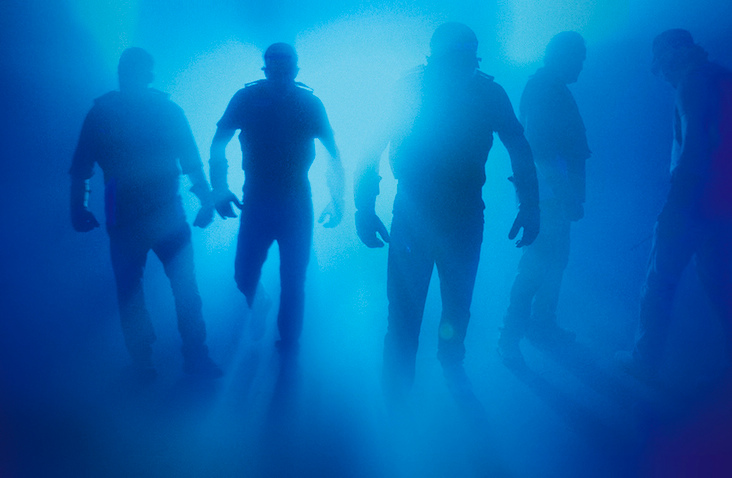
27. “Hyena”
If you felt a bit starved for great cop/crime movies this year, we might point you in the direction of “Hyena,” the sadly underseen second feature from writer/director Gerard Johnson. A “Bad Lieutenant”-ish picture about corrupt London drugs cops starring Ben Wheatley regular Peter Ferdinando (along with other familiar faces like Neil Maskell, Richard Dormer, MyAnna Buring and Stephen Graham), it’s a haunting, near-nightmarish hellscape with a very particular and very confident tone, and much of that is down to the excellent score by Matt Johnson, who’s not just the brother of the director, but also well known in the music world as The The. It’s an itchy, mostly electronic piece of work, looming with ominous dread and pulsing with the beat of the city’s underbelly underneath it, like something that Michael Mann would order if he was in a permanent K-hole. And just when you think you’ve got it pegged, it’ll shift, with some Eastern European influences entering the picture, or a hint of Tangerine Dream. “Hyena” has a difficult mood to shake, and this score is in large part why.
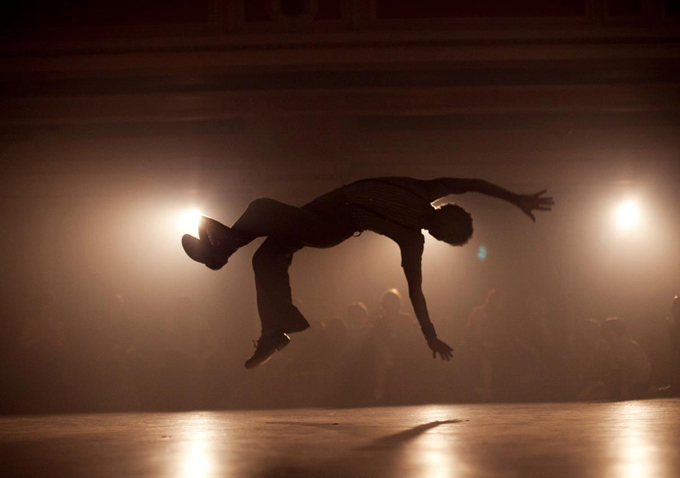
26. “Northern Soul”
For the uninitiated, the term Northern Soul refers to a dance movement in the North of England in the late 1960s and 1970s, where the nightclubs (most famously Twisted Wheel in Manchester and the Wigan Casino) were full of American soul music, often more obscure cuts away from the mainstream. Elaine Constantine’s film of the same name, which had a brief U.S. release this year a full year after it became a surprise sleeper hit in the U.K, is a coming-of-age picture set against the scene, and while it might rely on formula a little, it has a real energy and authenticity behind it that makes it a rather charming and underseen gem. Of course, if the soundtrack wasn’t utterly wonderful, the whole thing might have been a washout, but Constantine’s extensive selection of songs are pretty much impeccable. From well-known names like Frankie Valli and Marvin Gaye to songs that even record-collecting Northern Soul experts might not be familiar with, it doesn’t just soundtrack the film perfectly, it serves as an excellent starting point for someone getting to grips with the genre (the soundtrack release also has a bonus disc of songs not in the film, which is great too).
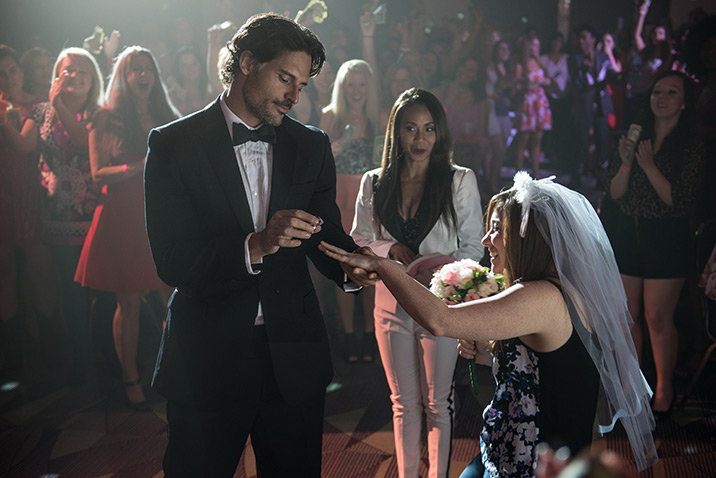
25. “Magic Mike XXL”
“Magic Mike XXL” might have switched genres from Steven Soderbergh’s original, away from the dark examination of the American dream and the economic crisis, and more towards a sort of goofy road movie/dance flick hybrid about, and for, the female gaze (we don’t mean this as a bad thing), and actors from the original like Matthew McConaughey and Alex Pettyfer might not have returned. But one thing hadn’t changed: The Kings Of Tampa had a pretty good playlist. Gregory Jacobs’ sequel featured a couple of reprises from the first film (if Ginuwine’s "Pony" hadn’t cropped up somewhere, there might have been riots), but otherwise succeeded in capturing the musical vibe of the first film — Jeremih & Lil Wayne and R. Kelly were among the songs, while adding a slightly different vibe. And that vibe, specifically, was a little more varied and light-hearted, with nu-soul singer Nick Waterhouse, the Backstreet Boys and Glass Animals all featuring. Plus, to complete the franchise’s transformation into full-on musical territory, some cast members got to sing too: Matt Bomer lent his impressive pipes to covers of D’Angelo and Bryan Adams, while Donald Glover contributes a charming version of Bruno Mars’ “Marry You.”
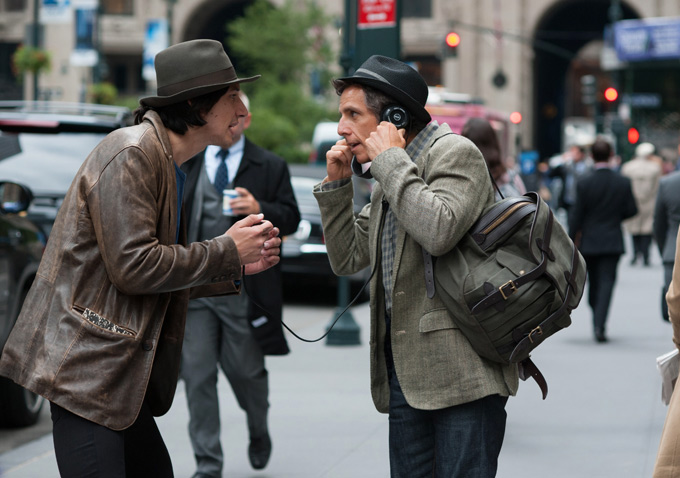
24. “While We’re Young”
If there was any doubt as to where Noah Baumbach’s sympathies lie in his generation-gap comedy “While We’re Young,” they’re probably put to rest by the soundtrack. Aside from one reasonably cutting-edge cut — the excellent Duke Dumont remix of HAIM’s “Falling" — the music to the movie is firmly steeped in the past, from James Murphy’s score instrumentally covering David Bowie’s “Golden Years,” to a smattering of Vivaldi, A Tribe Called Quest, The Psychedelic Furs and Wings. It might not be particularly cool, then (though Adam Driver’s character would undoubtedly say that that’s what makes it cool), but it still works beautifully. As with “Greenberg,” Murphy’s score is minimalist, but it’s more memorable here (his “We Used To Dance” is a truly gorgeous cue), while the film cannily deploys its very mixed bag of songs, including Lionel Richie’s “All Night Long (All Night),” Danny Kaye’s “The Inch Worm” and even “Eye Of The Tiger,” for god’s sake, in a highly effective and often very funny way. The result is very different from the music in “Mistress America” (see below), aside from Wings popping up in both, but proves just as memorable, and serves as a reminder that sometimes a soundtrack isn’t about trying to impress, but picking the songs that best serve the movie.

23. “Joy”
Like “Silver Linings Playbook” and “American Hustle,” music is everything to David O. Russell’s sonically jam-packed “Joy.” And given that the movie comes in many modes and flavors, the eclectic soundtrack also has many different varieties of riches. There’s a magical, enchanting quality to the film rendered by the use of Nat King Cole, Ella Fitzgerald and Frank and Nancy Sinatra, as well as a hopped-up jazz aspect (Lee Morgan, Chick Webb). The second of the movie has a more cocksure attitude as the disabused-of-her-dreams mom protagonist finally finds her way and voice — captured by The Rolling Stones, The Bee Gees, The Ronettes and Cream. There are also Latin flavors given from Edgar Ramirez’s Venezuelan Tom Jones-wannabe character (Ray de la Paz & The Pedrito Martinez Band, Elis Regina & Antonio Carlos Jobim). There are also great orchestral pieces from arranger David Campbell (Beck’s dad), and blustery guitar ambience and feedback from up-and-comer West Dylan Thordson. And it’s not on the soundtrack, but the crucial musical cue in the film is Buffalo Springfield’s celestial psychedelic opus “Expecting To Fly,” easily one of the most heavenly moments in film in all 2015.

22. “Heaven Knows What”
You can quite often tell when a movie replaced a composer midway through post-production, because the score for the finished film can end up feeling rushed and forgettable. The Safdie brothers faced that issue with their scorching addiction drama “Heaven Knows What” — indie musician Ariel Pink (who also cameos in the film) wrote 45 minutes of music for the movie, but the filmmakers ended up using only one song, the excellent “I Need A Minute.” They could have hired another Pitchfork favorite, or even a more traditional composer, but instead, the film’s ‘score’ is appropriated material. There’s a mix of tracks at play — Tangerine Dream’s "Phaedra" is used, for instance, along with tracks by Burzum and James Dashow. But the stuff that makes the biggest impact, to an unforgettable degree, are tracks by Isao Tomita, the Japanese synth instrumentalist, all of which are versions of Debussy compositions, including “Clair De Lune.” It’s an utterly unexpected yet wonderfully fitting choice, making their vision of the underbelly of New York seem alien, almost magical in places.
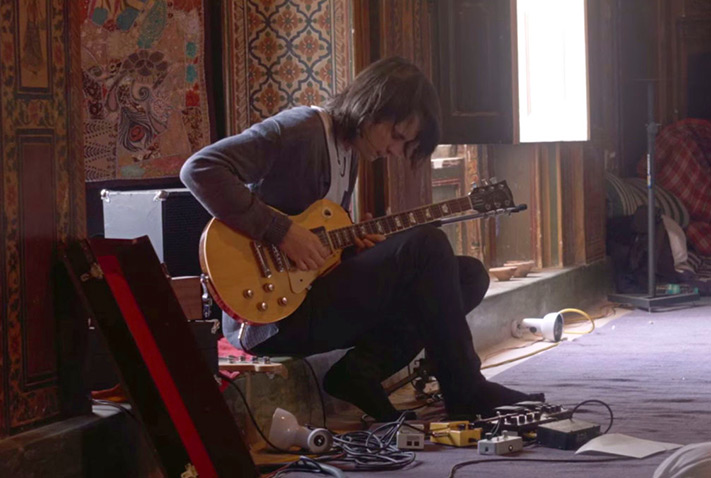
21. “Junun”
Yes, we’re bending our rule that music documentaries doesn’t quite count to include “Junun” here — but then, few music-related movies, or movie-related music, gave us much joy as this, so we’d be utterly remiss in excluding it. From Aimee Mann and “Magnolia” to the killer “Inherent Vice” soundtrack, Paul Thomas Anderson’s always had a good feel for the crossover of cinema and popular music — but that reached a peak this year with his surprise short doc, which saw the filmmaker follow his regular collaborator Jonny Greenwood to India during the recording of an album that features not just the Radiohead member, but also Israeli composer Shye Ben Tzur and The Rajastahan Express, among others. The film’s a loose, playful, fly-on-the-wall pleasure, and the music just as much so. If you’re put off by the vegan-lasagne vibe of what’s usually termed ‘world music,’ this might do a lot to convert you, either on its own (and it’s an inventive, terrifically performed, hypnotic album, gorgeous and bewitching and highly danceable), or paired with PTA’s lovely companion piece, which shows the absolute artistry that went into its making.
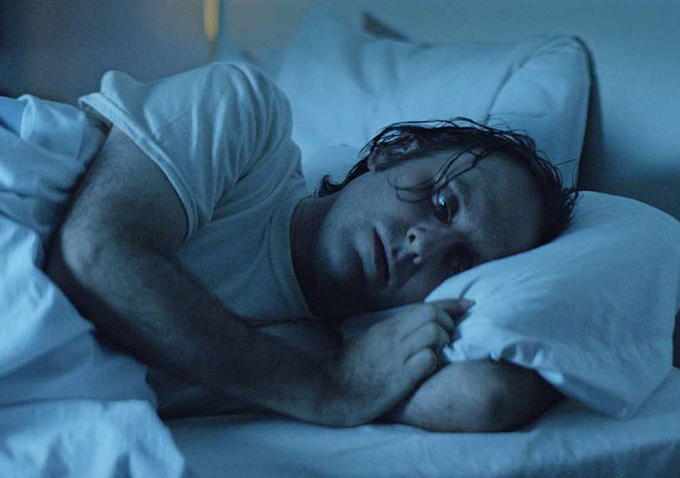
20. “Entertainment”
Rick Alverson’s films are utterly unique creations, unlike anything else out there in the indie world and very much an acquired taste — and his soundtracks are no different, particularly for this year’s “Entertainment.” The director’s Sundance-approved picture stars comedian Neil Hamburger (aka Gregg Turkington) as a version of himself as he tours around and plays to unenthusiastic audiences, and it’s appropriate for a film so closely tied to the alt-comedy icon that many of the film’s songs (which are the cherry on top of a pleasingly haunting score by Robert Donne) apparently come from Turkington’s own record collection. The picks are a collection of fascinating oddities and obscurities, including Italian band Pompeo Stillo & The Companions (the excellently named “He Was A Guitar Player And Now Plays Machine Gun”), soul singer Bill Moss, and Frank Sinatra Jr. Like the film itself, they do a good job at putting you on the backfoot and utterly discombobulating you: Every time a song kicks in, you have no idea what to expect, and yet they somehow hang together beautifully (especially on record, where they’re accompanied by some of Hamburger’s dialogue from the film).
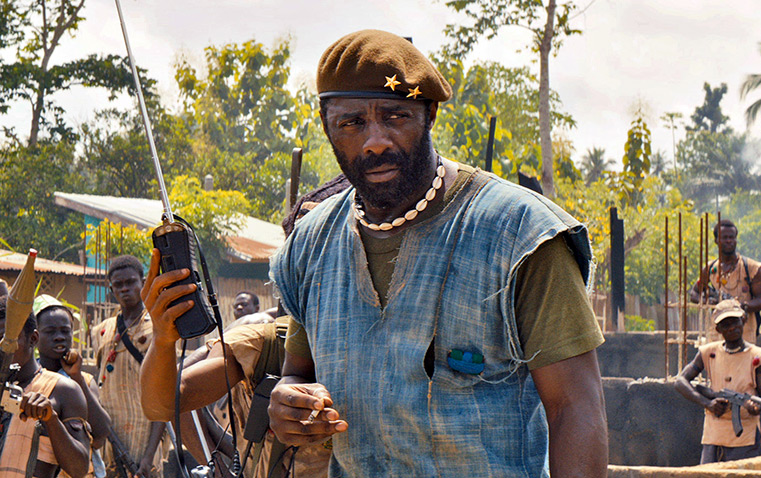
19. “Beasts Of No Nation”
Best known for his work co-composing “Beasts Of The Southern Wild” with that film’s director Benh Zeitlin, Dan Romer seems like an atypical choice for a film like Cary Fukunaga’s powerful child-soldier tale “Beasts Of No Nation” — he’s best known as a music producer whose film work has taken in indies like Joe Swanberg’s “Digging For Fire” this year, and the documentary “Finders Keepers.” But the tone he brings to the film proves to be crucial to creating the mood that Fukunaga is after. It’s minimalist stuff, all shimmering, glacial synths, distant menacing rhythms and ominous drones, like M83 live-scoring “Apocalypse Now.” It’s almost the last thing you’d expect from an Africa-set war movie, but Fukunaga was after something more universal, and Romer delivers, showing the horror of lead Agu’s brutal coming-of-age without tying it to a particular culture or even continent. Like the best films of this type, it’s less a document than a capturing of a nightmare, but Romer’s glistening, almost sci-fi score gives the viewer hope that, however bad things are, there might be dawn after all the darkness.

18. “Spotlight”
Howard Shore’s best known for his work with David Cronenberg and Martin Scorsese, and on scoring all six “Lord of the Rings”/“Hobbit” movies, which makes him an almost unlikely choice for a film like “Spotlight,” Tom McCarthy’s rigorous love-letter to investigative journalism, focused on the Boston Globe reporters who uncovered a cover-up of sexual abuse by Catholic priests. But Shore (who has some experience with this subject matter, having scored “Doubt” a few years back) turns out to be a perfect pick, with a haunting, powerful score that couldn’t be better suited to the movie. Steering away from the religious allusions or Boston Irish folksiness that lesser composers might have employed, Shore’s work here gives the film much of its propulsive, ever-searching energy, pushing you along with the journalists as they try to make their case, relying on a simple, almost minimalist piano-led collection of instruments. It’s as sober, understated, unsentimental and sophisticated as the film it works for, and yet it doesn’t feel like Shore’s restraining himself: Indeed, as different as it is from his other work, it feels like he’s the only composer who could have written it.
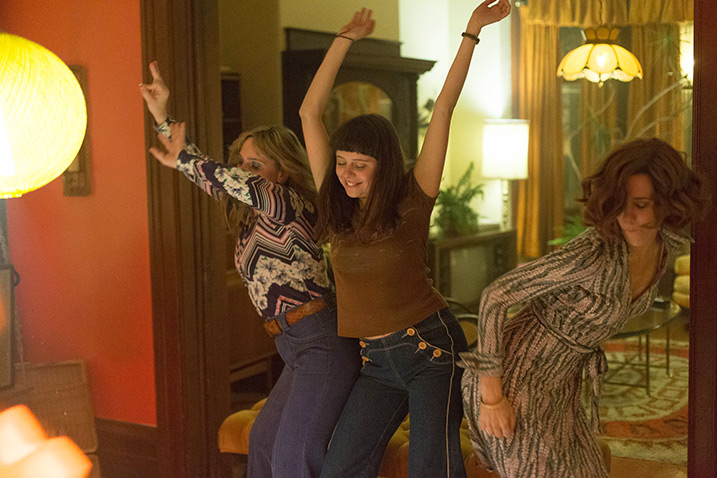
17. “The Diary Of A Teenage Girl”
It sometimes feels that the days of the immaculately curated comedy-drama soundtrack, full of expertly deployed yet unexpected cuts, is an increasing rarity. Masters of the form seem to be turning away from it, to some degree: Wes Anderson and Quentin Tarantino’s last films featured predominantly original scores, while Cameron Crowe’s most recent soundtrack, for “Aloha,” was a bit of an MOR disappointment. Thank god, then, for “The Diary Of A Teenage Girl.” Marielle Heller’s coming-of-age drama is finely honed on a number of levels, but especially so when it comes to the music. Nate Heller’s delicate, pretty score is very fine (and he contributes two lovely original songs), but the song selections are even better, playing into the 1970s setting and lightly psychedelic vibe without ever feeling like it’s making lazy or obvious choices. There’s a mix of glam rock (T. Rex, Mott The Hoople), punk or post-punk (The Stooges, Television) and some more obscure picks (The Rose Garden, Labi Siffre), but always used to let you inside the head of Heller’s protagonist, not just for emotional effect. It’s a gorgeous, surprising collection of songs across the board.
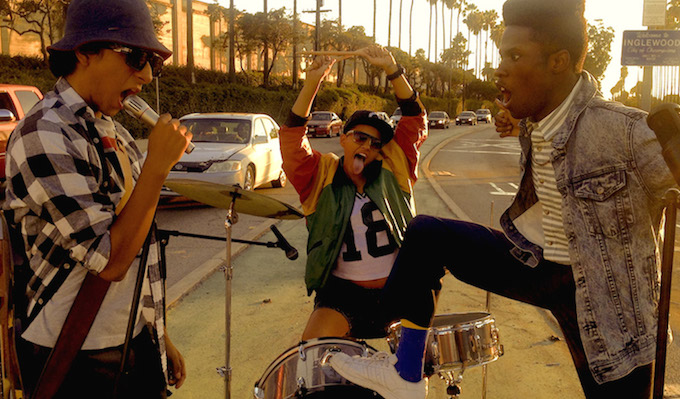
16. “Dope”
Few films this year were as infused by music from the marrow of their bones as “Dope,” Rick Famuyiwa’s winning coming-of-age movie, which might have had the best hip-hop soundtrack in years. The film focused on Shameik Moore’s hero, a ’90s-hip-hop-obsessed high schooler in a punk band with his friends, and Famuyiwa had help on the music side from about as big a person as you could hope for in the shape of Pharrell Williams, who came on board before the script was even written. Williams contributed a few original songs for the band-within-the-film, Awreeoh — genre-blending, noisy, joyous tracks reminiscent of his early work with N.E.R.D. — while he also helped to curate an absolutely impeccable selection of ’80s and ’90s hip-hop. The soundtrack touches on some familiar places — yes, Public Enemy’s “Rebel Without A Pause” is here, as is A Tribe Called Quest’s “Scenario” — but even if it’s not breaking new ground for fans of the genre, there’s no denying the effectiveness of the way that Fumiyawa’s film deploys the likes of Digable Planets, Nas, Digital Underground and Naughty By Nature, or how good they sound together on a disc.
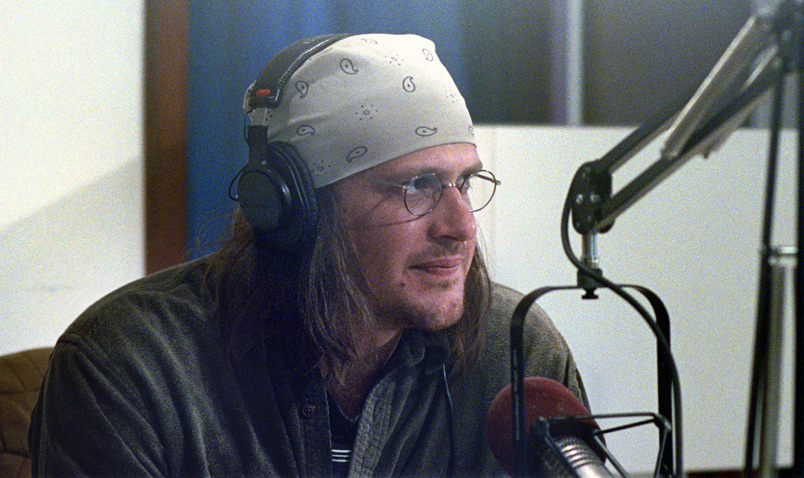
15. “The End Of The Tour”
We’d started to lose faith in Danny Elfman a little bit. The former Oingo Boingo member has been responsible for all kinds of great scores since Tim Burton brought him into the composition world, both with his most frequent collaborator and away from him (see “Men In Black,” “Good Will Hunting,” “Spider-Man,” Dolores Claiborne”). But it’s felt like he’s been resting on his laurels recently, relying on similar-sounding cues and vibes. That he was such an off-the-wall choice for James Ponsoldt’s “The End Of The Tour,” a modest indie about David Foster Wallace, was somehow promising, pushing him outside of his comfort zone, and Elfman ended up delivering his most satisfying score in years as a result. It’s vaguely remniscent of the best of his work for Gus Van Sant, but quite different too, more minimalist and chiming, pretty without ever becoming twee. Better still, the film deploys some terrific song choices, with Felt, R.E.M. and Brian Eno’s unforgettable “The Big Ship” (also used in “Me and Earl and The Dying Girl” this year) mixing with Tracey Ullman‘s novelty hit “They Don’t Know,” a perfect encapsulation of one of the film’s major themes: the mix of high and low art.

14. “Love & Mercy”
There was probably an easy way to score “Love & Mercy” — throw in some of The Beach Boys’ greatest hits, chuck in some nondescript music meant to echo the band, and call it a day. But as with so many things about Bill Pohlad’s excellent Brian Wilson biopic, the film goes the hard way when it comes to the music, and is all the better for it. Yes, the expected Wilson classics are there (though only five appear on the soundtrack release, excluding a lovely piano version of “God Only Knows” by Paul Dano), but the film gets truly fascinating with the score, by Atticus Ross, best known for his team-ups with Trent Reznor on the last few David Fincher movies. He’s flying solo here, but does some remarkable work regardless. It’s a dreamy, hazy score, without the electronic throb and hum of his Fincher work, using Wilson’s compositions as a jumping-off point, incorporating snatches of dialogue or vocals, essentially remixing as much as he is composing, and breaking down the walls between music and sound design. It’s essentially like being inside the troubled mind of Brian Wilson, and given that that’s the film’s stated intention, it’s something of a triumph as a result.
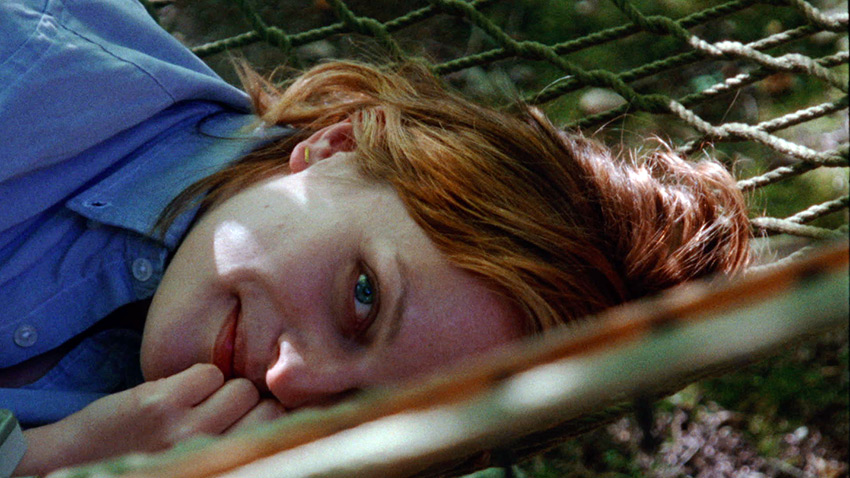
13. “Queen Of Earth”
As his appearance on our On The Rise Composers piece in 2014 might suggest, we’ve had our eye on composer Keegan DeWitt for a while: He first caught our attention with “Cold Weather” back in 2011, and has worked with a who’s who of the indie world, having a terrific year in 2015 in particular with “Unexpected” and “I’ll See You In My Dreams.” But his reteam with Alex Ross Perry (DeWitt’s score for “Listen Up Phillip” was one of our favorites of last year) might be his finest work to date. The film is both of a piece with the director’s earlier work and a significant departure, and that’s exactly true for DeWitt’s score, which is light years removed from the jazzy inflections of ‘Phillip,’ but is from recognizably the same person. Scratchy strings, low woodwinds and rhythm from a self-made instrument that the composer has termed ‘the wrechenspiel’ combine into an utterly unsettling work that, like the mind of the films’ protagonist, unravels as it goes on, abandoning the pretty melodies from the opening to become increasingly dischordant and nightmare-inducing. Like the film itself, the music burrows under your skin and lingers there for days afterwards.
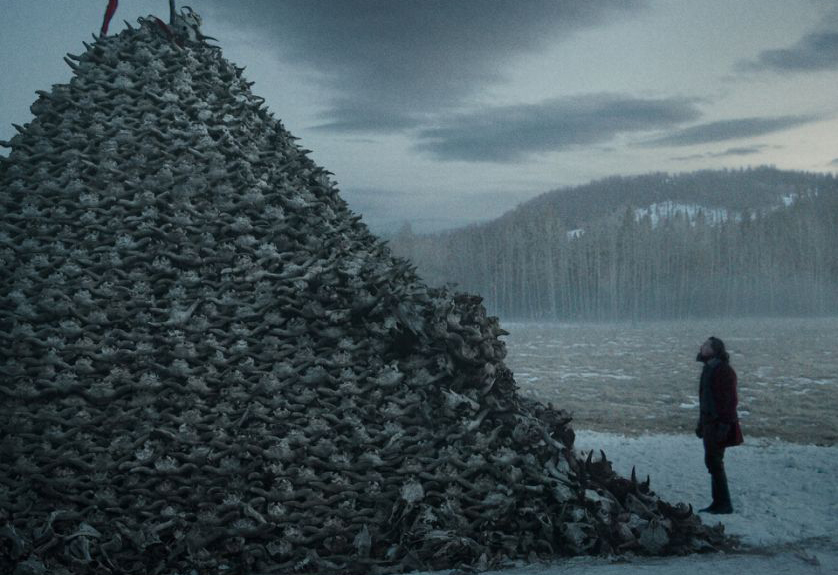
12. “The Revenant”
Unforgiving climates and unmerciful bastards are on the brain this winter with Quentin Tarantino’s “The Hateful Eight” and Alejandro González Iñárritu’s “The Revenant,” but where the former has a movie-ness and twisted sense of humor, the Mexican filmmaker’s grueling survival drama starring Leonardo DiCaprio is more a lament for the cruel, unmerciful world that its protagonist inhabits, and in which he seeks his own relentless revenge. It’s also a movie about a ghost, or a broken shell of a man who has lost all his loved ones, and comes back from the dead to deliver cold, ferocious revenge. The score by Ryuichi Sakamoto and Carsten Nicolai, with some additional music by Bryce Dessner from The National, is therefore mostly ghostly, ambient washes of melancholy, aching reminders of those who are no longer with us, and a cold, existential pain of loss and alienation. “The Revenant” may be superficially an exhausting two-and-a-half hour movie about brutal suffering and revenge, but its music expresses the soulful pain of its main character and an elegy for the decay of our collective humanity.

11. “Macbeth”
It’s easy to throw around charges of nepotism in the film industry, but if anyone could have accused Jed Kurzel of that before, he dispelled it with two terrific scores this year. The brother of director Justin, the Australian musician (who’s in popular blues-rock band The Mess Hall) made his composing debut with his bro’s “The Snowtown Murders,” a deeply ominous, discombobulating piece of work that gave the film much of its considerable atmosphere. Fine work on “The Babadook” followed, but then 2015 brought first his inventively folky score for John Maclean’s “Slow West” — arguably the best aspect of that movie that isn’t Ben Mendelsohn — and then, best of all, a reunion with his brother on his Shakespeare adaptation. The “Macbeth” score is just as dread-inducing as their last collaboration, but with more texture behind it: Mostly relying on strings (which sometimes feel like they’re being tuned even as they’re being played), it has something of the Scottish highlands about it (there are some bagpipes in there, it seems, though used subtly), but fitting Kurzel’s vision of the play, it also sounds like it could have come from Australia, or Siberia, or Westeros, or the moments before the sun explodes. Frankly, we can’t wait to hear what the Brothers Kurzel cook up for “Assassin’s Creed” next year.
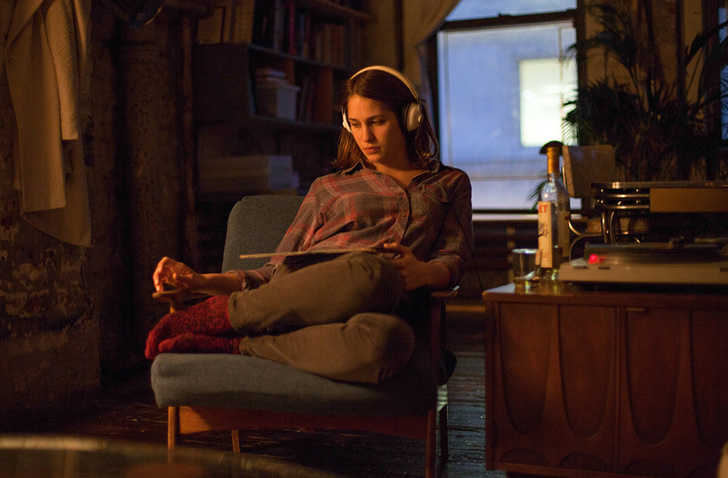
10. “Mistress America”
Noah Baumbach movies always have great selections of music, but he’s never quite mentioned in the same breath as Wes Anderson and Sofia Coppola, despite some outstanding uses of music in movies (see the use of Lou Reed at the end of “The Squid And The Whale,” and all of the super-underrated soundtrack to “Margot At The Wedding,” though admittedly that’s used subtly in the movie). But Baumbach not receiving his musical due probably changes in 2015 with the one-two punch of two great movies, both with terrific and inspired soundtracks and scores (see “While We’re Young” earlier). For his screwball comedy “Mistress America,” Baumbach again enlists Dean and Britta, the former Luna pair who also scored bits of ‘Squid,’ but here they work in an entirely different language. Given that the movie is inspired by ’80s madcap New York calamity movies like “Something Wild” and “Desperately Seeking Susan,” the songwriters imbue the comedy with a ’80s synth sheen that feels like it’s come straight out of a John Hughes movie. Not only does it lend the charming movie that credible air of unheard New Order, The Psychedelic Furs or Yaz tracks, but the gossamer air of the soundtrack dreamily radiates the notions of aspirations and hope with a melancholy bent underneath. Because while “Mistress America” is a comedy about a lonely college freshman and the impetuous 30-something entrepreneur/soon-to-be stepsister, it’s also about sisterhood, the dark side of ambition, and how these two things collide. Dean and Britta’s ebullient score, especially in moments when the duo are having magical moments in New York, gives you the sensation of walking on air.
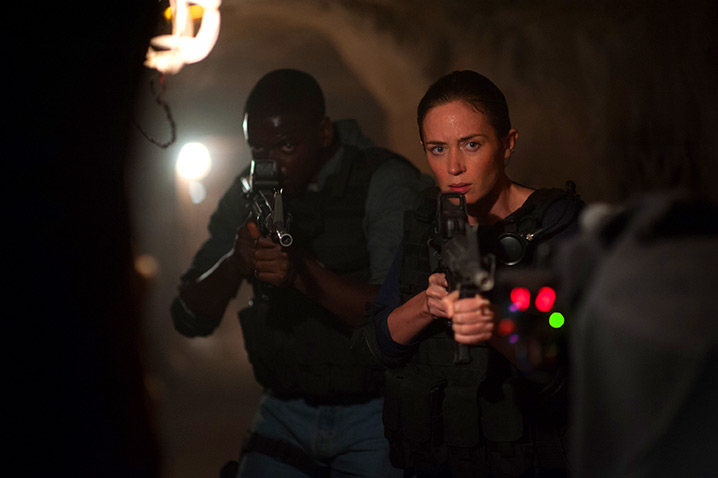
9. “Sicario”
Icelandic composer Jóhann Jóhannsson has been scoring movies for a decade plus, but he landed on the American radar in a big, big way with the wintry and haunting score for Denis Villeneuve’s “Prisoners” and he soon followed that up with an Oscar nomination for his music for “The Theory Of Everything.” Villeneuve and Jóhannsson’s second collaboration, for “Sicario,” is perhaps the best horror music score of the year not written for a traditional horror movie. The music for “Sicario” is terrifying: a slow-motion never-coming-back descent into the darkness of humanity. The booming and hissing music which rises and falls in volume with bloodcurdling power is the sound of dread, the soundtrack of certain doom, and the portentous howl of a soul soon to be enveloped by the blackness of the heart. It’s stressful, nail-biting stuff. Listen to the soundtrack on its own and you’ll discover much of the film’s heart-pounding anxiety comes from its incredible score.
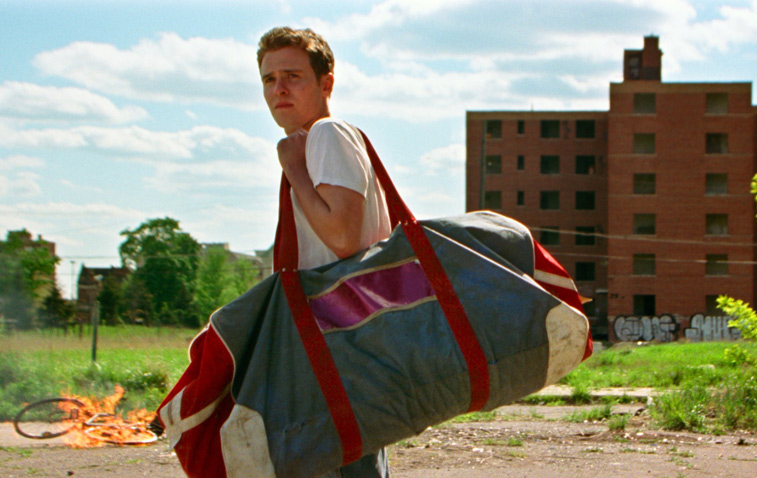
8. “Lost River”
Finding nice things to say about “Lost River,” Ryan Gosling’s already pretty-much-forgotten directorial debut, isn’t the easiest task. It’s a derivative mess of a film that’s visually striking, but doesn’t suggest that the star has absorbed much in the way of storytelling know-how from the various A-list directors he’s worked with. But one thing that does work like gangbusters in the film is the music, specifically Johnny Jewel’s score. Jewel, an electronica artist who runs the cult label Italians Do It Better, wrote an unused score for the Gosling-starring “Drive,” and contributed a couple of tracks under various aliases, but gets the run of the joint here, both as himself and under his Glass Candy, Chromatics and Desire names. It’s not dissimilar to the vibe from the music from Gosling’s two films with Nicolas Winding Refn, but moves into different places: the gorgeous, choral theme song, for one; a somewhat giallo-style, Goblin-esque influence for another. There aren’t many songs in the film, but they’re used well when they arrive, particularly a version of standard Deep Purple sung by Ben Mendelsohn in a Nick Cave-ish croon, and an original Jewel-penned song performed gorgeously by Saoirse Ronan.
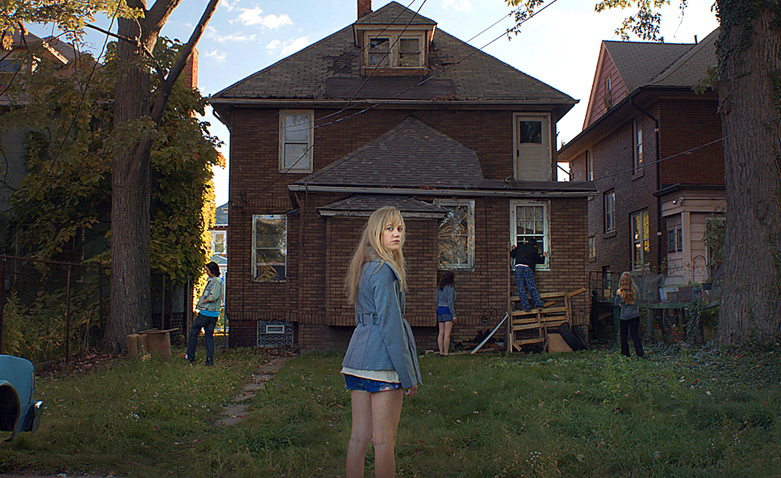
7. “It Follows”
Everyone and their mums in the genre world in the last few years have been making their horror scores sound like John Carpenter, to the point that it’s become just a little tired. It’s not that “It Follows” ignores that particular trope — there’s more than a little Carpenter in its eerie piano and shimmering synths — but composer Disasterpeace (otherwise known as Rich Vreeland) goes deeper and further in his attempts to creep you out in David Robert Mitchell’s terrific teen horror. Vreeland comes from the video-game world, with “It Follows” marking his first feature film score to date, and there’s something of the medium’s focus on atmosphere in his work, which from its earliest, more ambient cues (accompanied by a pulsing synth), immediately fills you with dread. It’s noisy, often abrasive, but can also be dreamlike (Vreeland proving a good fit for the woozy feel that Mitchell brings to suburban teendom), and even tuneful, as with the title cue. It’s one of the strongest horror cues in some time, and we hope Disasterpeace keeps on working, both within the genre and away from it.

6. “Eden”
If you’re making a movie about a DJ, you’d better make sure that your soundtrack is a banger (as Zac Efron flop “We Are Your Friends” discovered to its peril this year). Fortunately, “Eden,” Mia Hansen-Løve’s tremendous coming-of-middle-age film set over two decades in the french-touch scene, has a phenomenal collection of music behind it. The director’s brother Sven, who co-wrote the script with her, was himself a reasonably well-known DJ, like the film’s main character a sort of Rosencrantz & Guildenstern figure to Daft Punk’s Hamlet, and the deep knowledge of the house/disco/electronica scene over twenty years pays off with an expansive and extensive soundtrack that covers the obvious bases (Daft Punk’s “Da Funk,” Frankie Knuckles, The Orb, etc.), but also deeper cuts, smartly evolving (unlike, for the most part, its main character) with the musical form over time. The songs (nearly 50 in total) cover both the dizzying molly highs, and the thundering comedown, some impeccable sound design integrating the tracks into the movie whether they’re being spun on the decks or not.
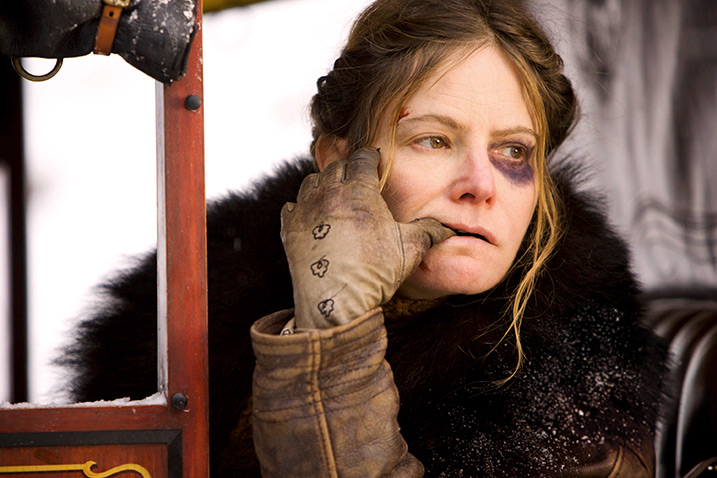
5. “The Hateful Eight”
Quentin Tarantino’s vicious and unmerciful mystery chamber drama movie has many facets: an epic scope of 70mm grandeur soaking up the majesty of the wintry Colorado mountainous, a mistrustful Agatha Christie-like suspense at its core; and a Western nostalgic tint for another age of cinema. It’s no wonder than that Tarantino enlisted the great Italian composer Ennio Morricone for his sprawling three-hour movie. The king of Spaghetti Westerns gives Tarantino vintage dusty symphonies — from opening overtures and grand musical intermissions harking back to the great Sergio Leone and epic films of this ilk — but something more. Where ‘Hateful Eight’ differs is its long, epic stagecoach journey to a cabin that turns into a literal hell. Thus, the threat of violence is baked into Morricone’s ominous score, one with many notes and touches of horror. Given the cold, bitter chill running through the veins of the brutal characters and the blizzardy frost that envelops the cabin they’re trapped in together, it’s probably not a surprise either that Tarantino also digs out tracks from another wintry classic: choice offcuts from Morricone’s score to “The Thing.” Morricone’s score is grand and sometimes chillingly suspenseful, giving the 70mm film its confident sense of scope and scale. Tarantino, a superb soundtrack supervisor, can’t resist a few other cuts too: tracks from David Hess and Roy Orbison that are so perfect, you’d think they were composed by the director himself.
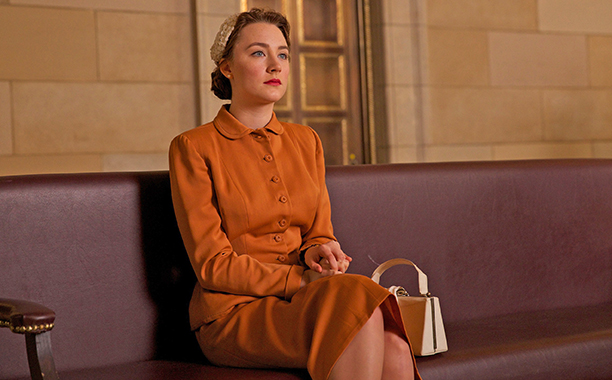
4. “Brooklyn”
John Crowley’s achingly expressive, intimate and deeply felt “Brooklyn” has so much going for it: impeccable craft on every level, the best performances its two leads Saoirse Ronan and Emory Cohen have ever revealed, a lovely lens to see it all through, and its ace in the hole: composer Michael Brook’s loving score. A movie about immigration, homesickness, choosing between loves and discovering your self, “Brooklyn” centers on an young Irish girl, Eilis (Ronan), who leaves family in friends to look for work in America. Alone, unsure of herself and unworldly, she’s devastated by the loss of her loved ones and the familiarities that make us feel grounded. Brook’s score, which never leans too heavily on the cliches of Irish music, is heartbreaking: lamenting violins, echoing piano notes, and the sad chime of glockenspiels all yearning and saying goodbye to an innocence the protagonist will never find again. Imagine being at a port wishing loved-ones farewell for good and then that hopeful moment when time has finally healed all wounds — it’s no wonder Brook’s utterly gorgeous score is like one big lump in the throat.
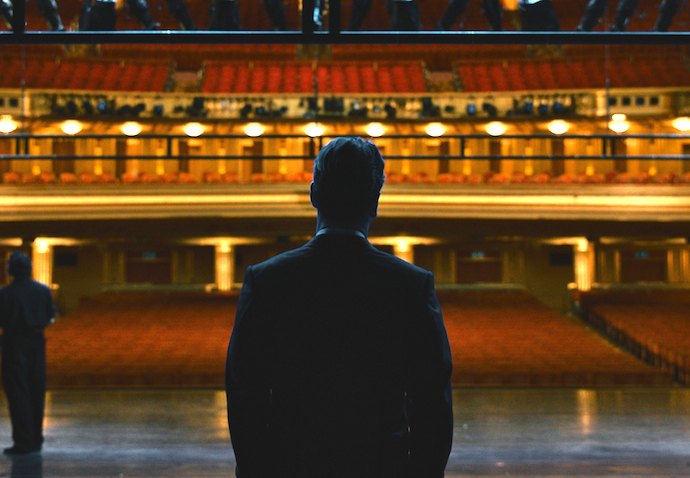
3. “Steve Jobs”
How do you humanize a genius who is often a monster and beyond reproach? In many ways this is the task that subtly falls on composer Daniel Pemberton in the Danny Boyle-directed, Aaron Sorkin-penned “Steve Jobs,” which is shaped in a rise-fall-reclamation format of Shakespearean dimensions. With the film cut into three acts, Pemberton, like everyone else, has to permit for three different stories. Thus, you have one opening act that is mostly throbbing with proto-electronic pulsations; an operatic second act full of traditional orchestral instruments and a darker edge; and a third segment that is more soulful and melancholic, as if to suggest that beyond the cold, intellectual, impatient exterior is a damaged man whose own operating system is in desperate need of repair. Act three also combines all of the aforementioned elements: dynamic and propulsive electronics, symphonic grandeur, and of course that anthemic ending right out of a Coldplay-meets-Sigur Rós collaboration that sends it sailing all home (the track in question is from British band The Maccabees). Pemberton wasn’t really on the radar a year ago, but after ‘Jobs’ and his terrific and exotic “The Man From U.N.C.L.E” score, it’s very possible you’ll be seeing him on these lists every year from here on out.
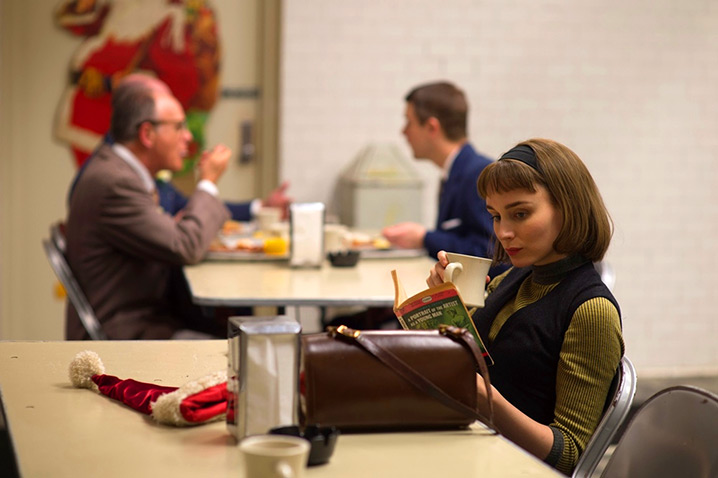
2. “Carol”
Somehow the great Carter Burwell has never been Oscar-nominated, despite decades of tremendous work with the Coen Brothers and others. But after a banner year that took in not just his other appearance on this list, but also lovely work on “Mr. Holmes,” that’ll surely be changing shortly. And likely, it’ll come with the gorgeous score for Todd Haynes’ “Carol,” which is some of Burwell’s finest music ever. It’s far from the most elaborate score here: simple piano and some strings, with the most stand-out element being the notable use of woodwind instruments (“B-flat clarinet, bass clarinet, bassoon — all of these things have a period, urban quality… it felt like the look of the film,” he told EW). The result is melancholy without being mournful, lush and romanic without being sentimental, classical without feeling old-fashioned. Haynes also had soundtrack-supervision king Randall Poster on board, so the film’s also littered with fantastic songs from the period, including The Clovers’ eminently danceable “One Mint Julep,” Billie Holiday’s “Easy Living,” and Helen Foster and The Rovers’ “You Belong To Me.”
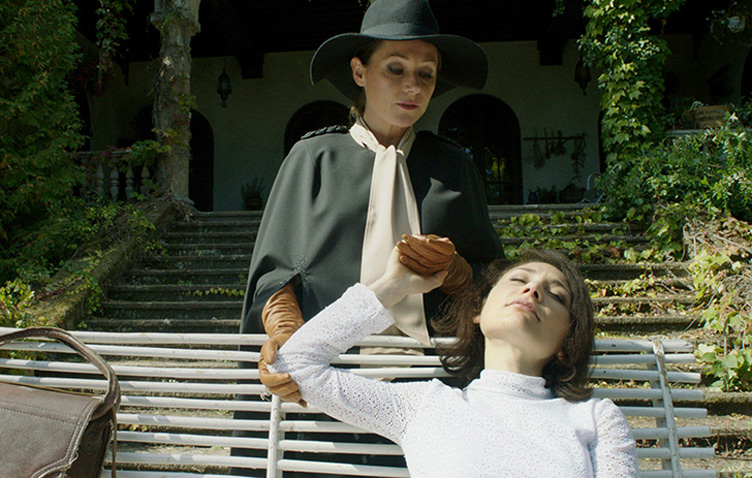
1. “The Duke Of Burgundy”
As anyone that saw “Berberian Sound Studio,” a film that almost lived and died on its sonic design and score by Broadcast, will know, what goes in your ears is as important to director Peter Strickland as what goes in your eyes. And for his tremendous, deceptively tender kink-romance “The Duke Of Burgundy,” he enlisted a surprising source for the score: Cat’s Eyes, aka Faris Badwan of British art-pop band The Horrors, and Canadian soprano Rachel Zeffira. The band’s self-titled album was a musical highlight of 2011, but their score for Strickland’s film (which came about after the great video artist Chris Cunningham hooked them up) marks a significant departure from that, dropping the psychedelic mod-pop for a sort of haunting, baroque folk feel. With influences as diverse as “Godfather” composer Nino Rota, John Barry and “The Wicker Man” soundtrack (the latter feels particularly prominent here, the band seemingly channeling “Willow Song” with the vocals), it’s a lush, organic sonic scape, with prominent harpsichord, flute and oboe that fits the very particular world that Strickland has created like a glove. It conveys both the utter beauty of this universe and the darkness underneath. It’s a score unlike anything we heard this year — and for that reason, and for many others, it’s our favorite of 2015.
Our lists have been reasonably comprehensive, but as ever, there wasn’t quite room for everything. Among our favorites that we missed were the Brian Eno-heavy score and soundtrack to “Me and Earl and The Dying Girl,” the aforementioned Daniel Pemberton score to ‘The Man From U.N.C.L.E” and Jed Kurzel’s score for “Slow West,” and the “Man Up” soundtrack.
Also making an impression, though in somewhat of a grey area due to being music documentaries, were “Amy” and “Cobain: Montage Of Heck,” while we also enjoyed Warren Ellis’ “Mustang” score, the music in “Tangerine” and “James White,” Max Richter’s “Testament Of Youth” score, the soundtracks to Spike Lee’s “Da Sweet Blood Of Jesus” and “Chi-Raq,” the well-curated “Insurgent” compilation, Olga Neuwirth’s “Goodnight Mommy” score, Fernando Velázquez’s “Crimson Peak,” and Joe Kraemer’s playful work on “Mission Impossible: Rogue Nation.”
And that’s not to forget Daniel Lopatin’s music for “Partisan,” the aforementioned Keegan DeWitt for “Unexpected,” Daniel Thomas Freeman and Matthew Watson’s brilliantly abrasive “Catch Me Daddy” score, Michael Giacchino’s work on “Inside Out” and “Tomorrowland,” and Hans Zimmer’s ‘Chappie.” Dividing the office was Junkie XL’s “Mad Max: Fury Road” score — for some, the most memorable action music of the year; for others, a Zimmer-derivative mess. Let us know if there’s anything you loved that we didn’t shout out in the comments.
Click here for our complete coverage of the Best of 2015
– Oliver Lyttelton, Rodrigo Perez

